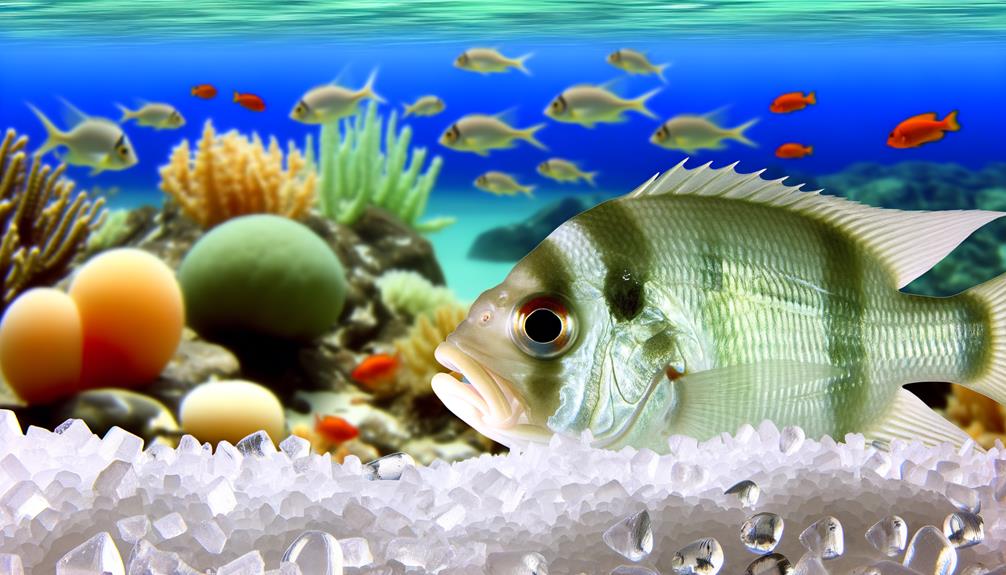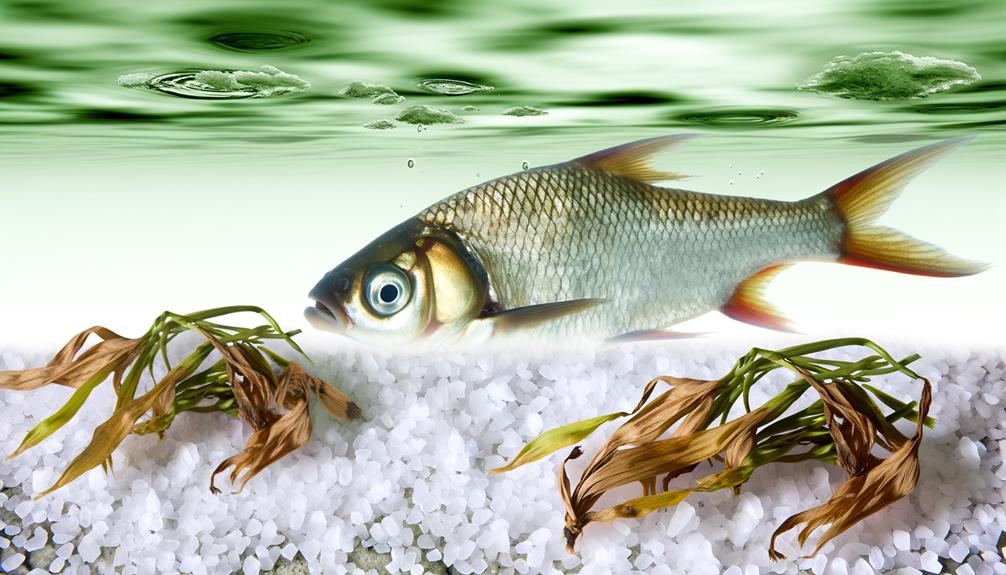The intriguing life of freshwater fish and their inability to survive in saltwater environments is a testament to the complex nature of aquatic life physiology and the influence of osmotic balance. Predominantly, it's the principles of osmosis and the fish's lack of adaptive mechanisms to counter high salt concentrations that contribute to their demise in saltwater.
Exploring this further could shed light on the intricate balance of life beneath the water surface and the unique survival adaptations of different aquatic species.
Key Takeaways
- Freshwater fish struggle in saltwater due to osmotic dehydration, leading to internal stress and potential mortality.
- The process of osmosis, driving water from low to high solute concentrations, disrupts the internal functions of freshwater fish in saltwater.
- High salinity negatively affects freshwater fish health as they lack adaptations for regulating water loss in such conditions.
- Exposure to saltwater induces physiological stress in freshwater fish due to their inability to balance internal salt concentrations, often resulting in death.
Understanding Fish Physiology
Diving into the intricacies of fish physiology, it becomes evident that freshwater fish are unable to survive in saltwater due to osmotic dehydration and an inability to effectively regulate water loss in high salt concentrations. This phenomenon is primarily driven by the disparity in salinity between the fish's internal environment and the external saltwater habitat.
Osmoregulation, a crucial aspect of fish physiology, is the process that allows fish to maintain their internal water balance. However, the high salt concentration in saltwater disrupts the freshwater fish's osmoregulatory functions, leading to substantial water loss from their bodies – a condition known as osmotic dehydration. This dehydration, coupled with the inability to regulate water loss, results in internal function disruption, thereby inducing significant physiological stress on these organisms.
Beyond osmotic effects, the elevated salinity of saltwater exerts further stress on freshwater fish. The fish's physiology is ill-equipped to counterbalance this salinity imbalance, ultimately leading to health issues and, in many cases, death. Understanding these physiological challenges is key to comprehending the freshwater fish's struggle to survive in saltwater environments.
The Science of Osmosis
Building on the physiological challenges faced by freshwater fish in saltwater, it becomes crucial to explore the fundamental process of osmosis, which plays a pivotal role in this phenomenon. Osmosis is a scientific process through which water moves across a semipermeable membrane from an area of lower solute concentration to an area of higher solute concentration.
In the case of freshwater fish, their internal environment is adapted to low salinity, meaning their solute concentration is higher than that of their surrounding environment. When introduced to saltwater, a medium of high salinity, osmotic pressure drives water out of the fish's body to equalize the solute concentration. This water movement results in severe dehydration for the freshwater fish, disrupting their internal functions and leading to their eventual demise.
Understanding the science of osmosis is thus integral to comprehending how exposure to saltwater environments can be fatal for freshwater fish. The osmotic pressure, resultant water movement, and the change in solute concentration offer a detailed insight into this biological predicament, underscoring the delicate balance that freshwater fish maintain in their native habitats.
Salinity's Impact on Aquatic Life

In examining the profound influence of salinity on aquatic life, it is of utmost importance to consider the drastic effects that saltwater environments can have on freshwater fish. The salinity of the water dramatically alters the osmoregulation process in fish, causing significant physiological stress that can be detrimental to their health.
High salinity in saltwater causes water to move out of the fish's cells through osmosis, leading to a state of dehydration. Unlike euryhaline species that can survive in varying salinity levels, freshwater fish lack specific adaptations to regulate water loss in high salt concentrations, causing disruption in their bodily functions.
Consider the following:
- Salinity imbalance in saltwater can be fatal for freshwater fish due to their inability to cope with osmotic stress.
- Rapid exposure to high salinity induces significant physiological stress on freshwater fish, impacting their health negatively.
- Understanding the impact of salinity on aquatic life is crucial for conservation efforts and maintaining healthy fish populations.
Survival Mechanisms of Freshwater Fish
Despite their inherent lack of adaptations to high salinity environments, freshwater fish have evolved a myriad of survival mechanisms to persist in their freshwater habitats. The core of these mechanisms lies in their osmoregulation system, a process that allows them to maintain a constant balance of water and salts within their bodies despite the surrounding environment.
In freshwater, which is hypotonic, the concentration of solutes is lower outside than inside the fish. This causes water to move into the fish, while salt diffuses out. To compensate, freshwater fish constantly drink water, excrete large amounts of dilute urine, and actively transport salts into their bodies from the surrounding environment.
However, this osmoregulation system is challenged when freshwater fish encounter saltwater. Saltwater fishes live in hypertonic environments, where the concentration of solutes is higher outside than inside. Therefore, they have different mechanisms to handle the excess salt.
Unlike euryhaline fish, which can survive in both freshwater and saltwater, most freshwater fish lack the necessary adaptations to handle the sudden shift in salinity. This inability to effectively manage the osmoregulatory stress caused by saltwater leads to internal disruptions and potentially fatal health issues.
Consequences of Saltwater for Freshwater Fish

What are the consequences when freshwater fish, lacking the necessary osmoregulatory adaptations, are exposed to the high salt concentrations of saltwater? The transition from freshwater to saltwater, a concentrated solution, is a stark shift that freshwater fish are not equipped to handle. Unlike euryhaline species or saltwater fish that survive by drinking heavily and excreting salt, freshwater fish lack the ability to regulate their internal salt and water balance in such environments.
In such cases, water moves out of the fish's body towards the higher concentration of salt in the water, a process known as osmosis. The consequences include:
- Dehydration: As water moves out, the fish suffers from severe dehydration, leading to functional disruption.
- Physiological Stress: The inability to balance internal salt concentrations can cause significant physiological stress.
- Mortality: Ultimately, if the fish can't adapt, it cannot survive in the saltwater environment, leading to its death.
This is why freshwater species can't thrive in saltwater, and why we can't see saltwater fish live in freshwater without adaptation. The osmoregulatory challenge and the resulting health complications are too great to overcome.
Frequently Asked Questions
Why Would a Freshwater Fish Die in Saltwater?
Freshwater fish lack the necessary adaptations to survive saltwater's high salt toxicity levels. Osmotic pressure effects cause water to leave their bodies, leading to dehydration, internal disruption, and eventually death.
Why Does a Freshwater Organism Die in Saltwater?
Freshwater organisms perish in saltwater due to disrupted osmotic balance, gill functionality impairment, and cellular damage from salt toxicity. Lack of survival adaptations for such aquatic environments leads to inadequate salinity tolerance, impacting species diversity.
Can Fresh Water Fish Survive in Salt Water?
Freshwater fish lack the biological mechanisms for saltwater acclimatization, negatively affecting their osmotic balance and fish physiology. Their survival odds decrease due to adaptation limitations and saltwater toxicity upon an abrupt environment switch, exceeding their tolerance threshold.
How Long Does It Take for a Freshwater Fish to Die in Saltwater?
The survival duration of a freshwater fish in saltwater varies, but death can occur rapidly due to osmotic imbalance, gill dysfunction, and salt poisoning. Fish adaptability and salinity tolerance influence this death timeline.
Conclusion
In conclusion, the osmotic equilibrium of freshwater fish, a delicate balance predicated on their physiological adaptation to low-salt environments, is irreversibly disrupted in saltwater.
This disbalance, a silent yet lethal assailant, incites a chain of internal dysfunction leading to their unfortunate demise.
Understanding this stark reality underscores the crucial role of salinity in shaping aquatic life's survival, serving as a poignant reminder of the profound influence of environmental conditions on the delicate dance of life and death in our planet's diverse ecosystems.
